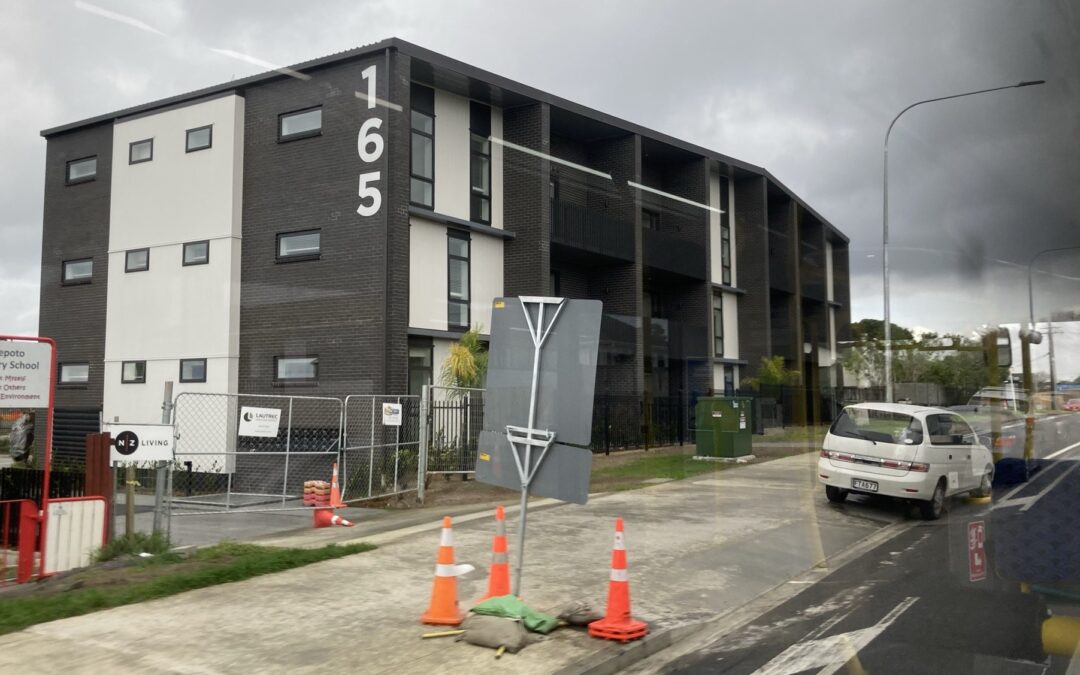
Outside the old style state house my mum grew up in, in Roskill.
Opinion piece first published in Stuff’s community papers October 2023
Julie Fairey, Councillor for Albert-Eden-Puketāpapa ward
For twenty years, I’ve lived in a Kāinga Ora dominated neighbourhood called Waikōwhai, south of Mount Roskill. We bought a 1960s three bedroom two storey house across the road from what were then Housing NZ properties, attracted by the short walk to a primary school and the mixed neighbourhood of private renters, social housing and owner occupiers like us.
The diversity of the area, along with a wonderful neighbour, is what has kept us here for two decades with no plans to move, as we have added three children to the population. Kāinga Ora is redeveloping around us now, putting in more housing which Auckland desperately needs, in particular in our central suburbs where public transport, schools, jobs and parks are easily accessed.
As Kāinga Ora rejuvenate the neighbourhood they are improving footpaths, roads and stormwater infrastructure, undergrounding power lines, and expanding the local park, as they have already done over in nearby Roskill South. Yes it’s messy and dusty and noisy at times, but it helps knowing it will be nicer in the future, and will provide warm dry homes to a lot more people who need a place to live.
So I was sad to hear about the arson attack on a Kāinga Ora development in East Tāmaki in July, and the furore that shut down a Kāinga Ora information session in Manurewa recently.
The abuse of Kāinga Ora staff in person, online and in the media, and the frequent negative implications about Kāinga Ora tenants disappoint me, not only because they dehumanise people, but also because these are some of our most vulnerable residents.
The people being yelled at, having lies told about how they live and work, only get into state housing because they do not have enough income to afford a private rental. Most of Kāinga Ora’s adult tenants are in work, and if they are on a benefit it’s often due to illness or age. In addition, our current economic system relies on some people being unemployed, so how can we be cruel to people without paid work and blame them for needing help?
We have families living in cars, crammed into garages, desperate to get out of emergency housing in hotels, and some of us are actively denying them a home. I am disappointed that some Aucklanders would go to the effort to petition, make signs and t-shirts, and yell down people to try to stop new people from being part of their neighbourhood.
Nobody gets everything right all the time, but in my council work I’ve found Kāinga Ora to be more approachable and accountable than private developers and landlords. Kāinga Ora developments are adding much needed housing capacity for my street and across the city, with a mixture of new state housing and affordable homes as well as dwellings sold on the market. These changes maintain and enhance the wonderful diversity I already see around me; many different cultures and life experiences, people at all seasons of their lives.
A generation ago it was not seen as a sin to need housing help from the government. John Key and my own mum both grew up in state housing. Just as many New Zealanders have come to understand the great benefits that migrants bring to our communities, I hope we can once again recognise the upside of state housing in our streets and cities.

